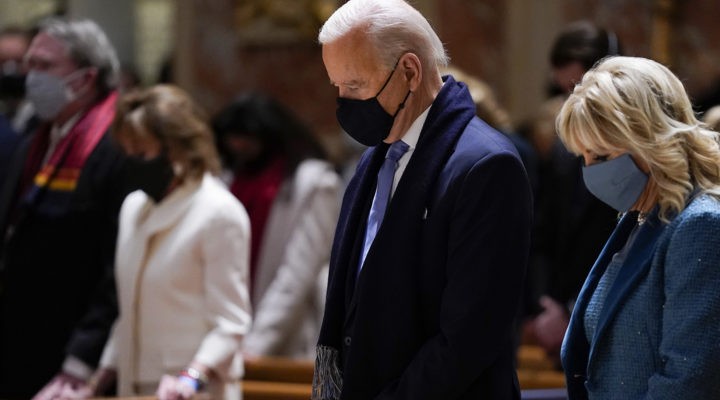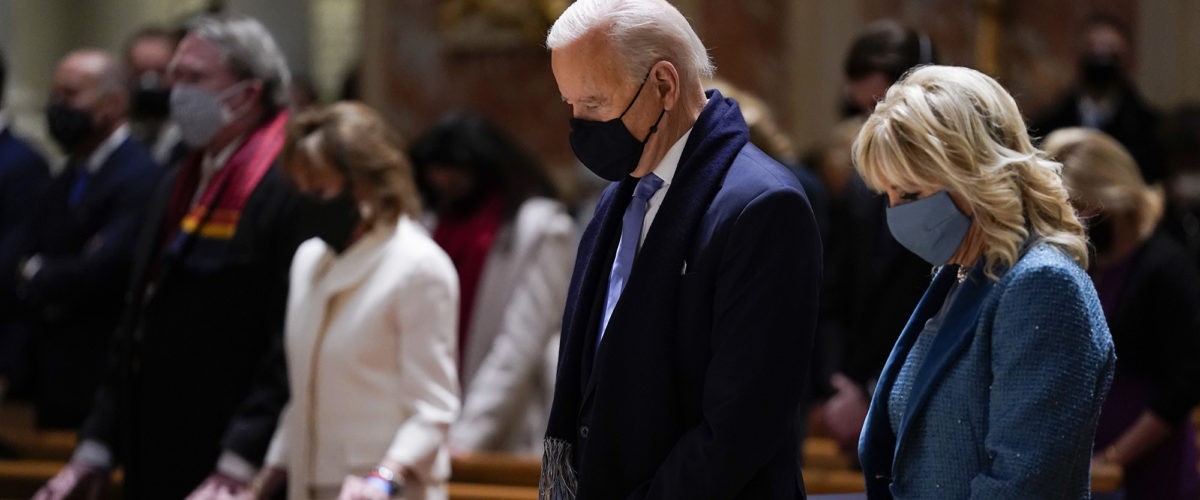The continual shift of the Southern Baptist Convention to the right was echoed by the latest meeting of the United States Conference of Catholic Bishops. Last Friday, the USCCB voted to create a teaching document that could rebuke and exclude some Roman Catholic politicians, including President Joe Biden. If approved, the document could prevent politicians like Biden who do not align with the Catholic Church’s view on abortion from receiving Holy Communion.
The decision to draft “a formal statement on the meaning of the Eucharist in the life of the Church” comes after Biden’s reversal of some of the abortion restrictions implemented during the Trump presidency. In response to these reversals, American bishops overwhelmingly voted after three days of virtual discussion — with 168 votes in favor and 55 against — to create this “teaching document.” The document will need approval from two-thirds of the bishops at the next USCCB meeting before it is formally accepted.

Laura Ellis
As only the second Catholic president in U.S. history, Biden’s political view on abortion has raised eyebrows of many conservative Catholics. Bishop Donald J. Hying of Madison, Wisc., says he meets with many parishioners “who are confused by the fact that we have a president who professes devout Catholicism and yet advances the most radical, pro-abortion agenda in our history.”
Other bishops worry this conversation is weaponizing the Eucharist for the purpose of political gain, as it uses the Catholic Church to specifically target some politicians and political positions. Bishop Robert Coerver of Lubbock, Texas, sees a political motivation behind the urgency to discuss and draft this document. “I can’t help but wonder if the years 2022 and 2024 might be part of the rush. And I think we need to be real careful not to get embroiled in the political situation,” he told NPR.
Since the USCCB vote, more than 50 Catholic Democrats in the House of Representatives signed a press release condemning the bishops’ decision. They wrote: “No elected officials have been threatened with being denied the Eucharist as they support and have supported policies contrary to the Church teachings, including supporting the death penalty, separating migrant children from their parents, denying asylum to those seeking safety in the United States, limiting assistance for the hungry and food insecure, and denying rights and dignity to immigrants.”
Rather than a sudden commitment to enforce all Catholic teachings by way of restricting the Eucharist, this most recent vote is clearly an attempt to reprimand and punish specific political ideologies. The movement of conservatism within the American Catholic Church is dictating which political positions are unforgivable.
“The movement of conservatism within the American Catholic Church is dictating which political positions are unforgivable.”
This religious involvement in the culture wars echoes a similar power play seen in the SBC, whose recent annual meeting grappled with topics parallel to current Catholic discourse.
In the aftermath of the Trump presidency, both denominations are wrestling with how their past alignments with the administration will dictate their futures. And as traditions that negate women’s ability to lead, both are led by men who are attempting to address issues largely faced by women. This is evident in recent decisions on abortion as well as the ongoing problem of sexual abuse in both denominations.
Jesuit priest Thomas Reese told NPR that because of their leadership structure, both Baptists and Catholics are “having a hard time dealing with women today.” One outcome of this failure is that some women are leaving these traditions. Most notably, Beth Moore recently left the SBC due to the denomination’s alignment with Trump and failure to address sexual abuse.
Women are not the only ones leaving, though, as attendance in both denominations continues to steadily decline. And as churches are struggling to get members to come back to in-person services, a decision like the USCCB vote — which is based on exclusion — seems counterintuitive. Cardinal Blase Cupich of Chicago noted, in this time the “real challenge before (bishops) is welcoming people back to the regular practice of the faith and rebuilding their communities.”
“As churches are struggling to get members to come back to in-person services, a decision like the USCCB vote — which is based on exclusion — seems counterintuitive.”
Although there has not been an official response from Pope Francis since the Americn bishops’ vote, the Vatican is emphasizing the need for unity. Top doctrinal official Cardinal Luis Ladaria, wrote in a letter to American bishops before the conference that this vote could “become a source of discord rather than unity within the episcopate and the larger church in the United States.”
This discord is foreshadowed by a Pew Research study that recently found 67% of adult Catholics in the United States believe Biden should not be denied Communion because of his stance on abortion. There also is a subtle discord felt between the USCCB and the Vatican in Francis’ silence after the vote, as the American Catholic Church moves in a direction contrary to Rome.
While the consequences of this discord are not yet fully seen, it is clear the USCCB vote indicates the prominence and power of conservative Catholics. And on the heels of the SBC annual meeting, we see the two largest Christian traditions in the United States continually leaning to the right. Regardless of popular opinion or declining membership, the power at the seat of both denominations in this country is with the conservative movement.
Laura Ellis currently serves as a Clemons Fellow with BNG. She recently graduated from Boston University School of Theology with a master of divinity degree. She is originally from Abilene, Texas.
Related articles:
United Methodists will welcome President Biden for Communion
With a Catholic president in office, America’s bishops threaten to sanction him over abortion
2020 vote shows religious identity held steady with slight change among Catholics and Mormons
This year’s tug of war over the Catholic vote and why it matters
America’s second Catholic president faces a vastly different landscape than the first


